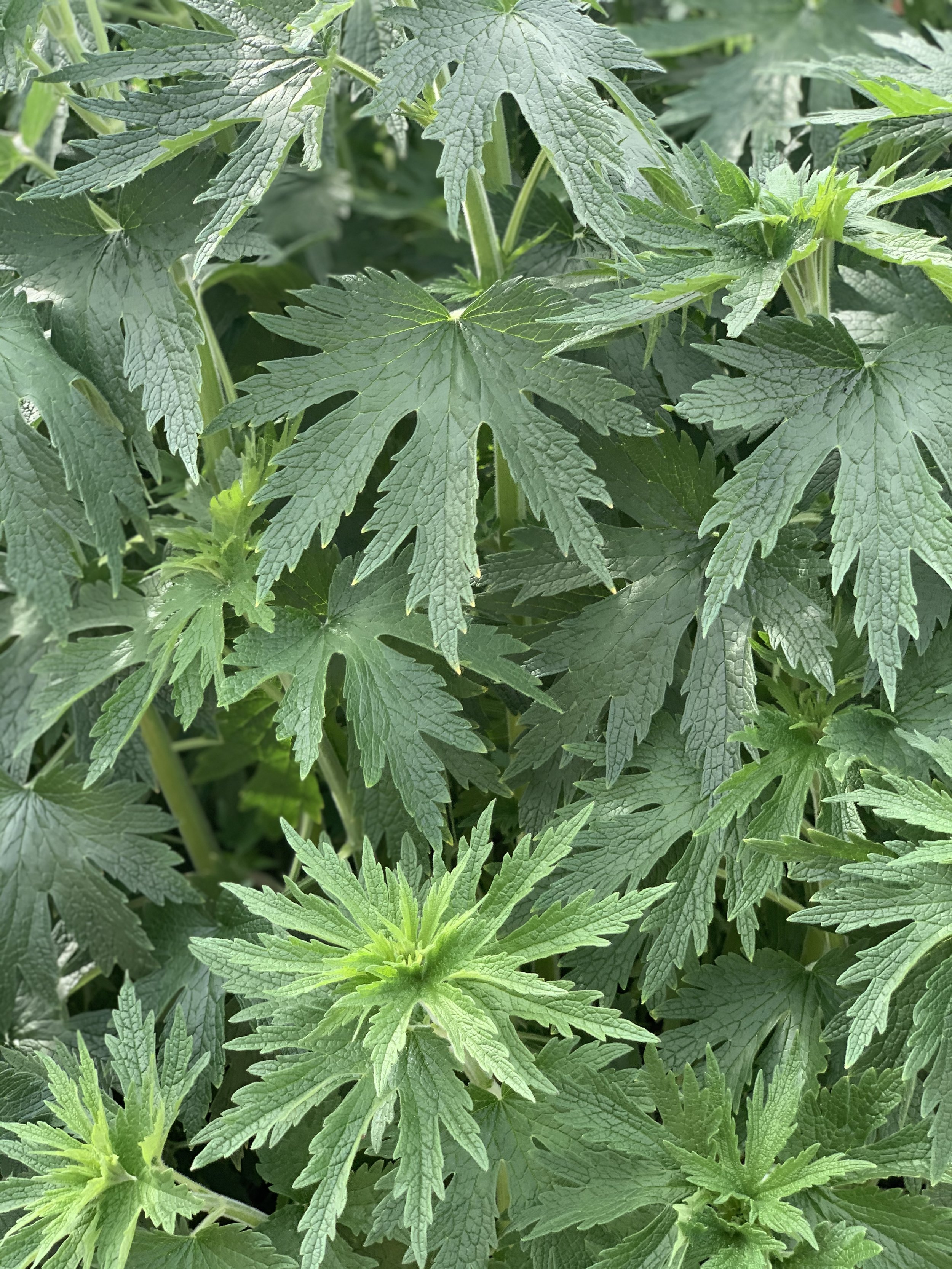
Leonurus cardiaca.
Motherwort
“There is no better herb to take melancholy vapours from the heart, to strengthen it, and make a merry, cheerful, blithe soul.” — Nicholas Culpeper, 1653
Common names: Common Motherwort, cowthwort, lion’s ear, lion’s tail
Taste: Bitter taste and pungent ordor
Energetics: Drying and cooling
Parts used: aerial part of the plant, harvested in August/September including leaves and flowers. Wear gloves, as the flowers are spiney. Harvest about the top 8 inches. Disguard woody stems.
Properties: Alkaloids, bitter glycosides, volatile oil, tannins, vitamin A, leonurine (a blood pressure reducing compound)
Actions: Nervine, antispasmodic, hypotensive, vermifuge, emmenagogue, cardiovascular tonic, digestive bitter and carminative, diaphoretic, diuretic, uterine tonic,
Ethnobotany + Cultural Wisdom: An important heart herb since Roman times, Motherwort also known as Leonurus cardiaca, derives it’s latin name from the Greek word for “lion’s tale, indicative of the shape of the flowering tops of the plant. Used to Mrs. Grieve wrote Motherwort is “allaying nervous irritability and inducting quiet and passivity of the whole nervous system.” Native to Europe, Greece, and central Asia. Found in fields and wooden hillsides.
Motherwort is a biennial member of the mint family. It's native to the southeastern part of Europe and central Asia. The flower stalk is covered with numerous light purple or pink flowers. The flower stalk appears during its second year of growth and can reach 5 feet in height. The flowers produce thousands of seeds, so motherwort often self sows. Motherwort is considered to be invasive in some areas. Remove the stalk before the seeds mature to prevent it from becoming too numerous in your garden.
Modern Uses: ideal as a tonic for the heart. Motherwort’s actions beautifully show us the connection between the physical and spiritual heart. It is often used when there is a rapid, fluttering, or pounding heartbeat (palpitations) associated with anxiety or nervousness. Through this, we can see that it acts on the physical heart by decreasing palpitations and mild hypertension while also acting on the spiritual heart to soothe and calm anxiety. An additional benefit of motherwort is that it is calming without being overly sedating. an emmenagogue, which is an herb that is used to promote delayed menstruation. Emmenagogues like motherwort are indicated when there is scanty menstruation or cramps associated with delayed menstruation. Many herbalists recommend using it regularly to tone the uterus, which reduces menstrual cramping in the future. Traditional usage (TWM): menstrual woes, tonic to the heart. Decorative flowers on a lithe and blowsy plant.
Origin: Native to Asia + Europe. Plant prefers part shade to full sun, regular garden soil and plenty of water. Sow in the fall or early spring. Barely cover seed with soil, tamp securely and keep evenly moist until germination, which occurs in 1 to 3 weeks. Direct seed in garden or work up in pots. Thin or transplant to 1 to 2 feet apart.
Cultivation: Truly so easy to cultivate that this plant can boarder on invasive, if it weren’t so pleasant to grow and offer such healing medicines. Not only to humans — Motherwort is a bee-friendly plant, and the flowering tops are often covered the afternoons of hot summers. Growing in hardiness zones 3 -9, she enjoys full sun to partial shade, appreciates well-drained sandy loam, but can tolerate poor soil. She’s drought tolerant and cold-hardy. Cutting to the ground at the end of the season assures a lush regrowth. She’ll stay on the stocky-side in cooler climates, while growing quite tall in hotter climates (up to 5 feet tall). Bi-Perennial, the second year will bring delicate pink flowers to the spiky seed husks (sometimes called “fruit.”) The contrast is truly wild. Generally resilient to disease, Motherwort is a strong plant. Disease can happen (spotting on the leaves is a strong indicator) ladybugs are incredibly effective at restoring health.
Medicines: Tinctures + teas, although as a tea can be very bitter.
Plant Allies: LemonBalm, Skullcap
Resources.
Ody, Penelope. The Complete Medicinal Herbal. Dorling Kindersley, Inc. NY, NY. 1993. Pg74
Mrs. M. Grieve. A Modern Herbal: Volume II I—Z. Dover Publications, NY, NY. 1971 Pgs 555-56
http://thefarmersgarden.com/blog/How-to-Grow-Motherwort.php
https://www.eclecticschoolofherbalmedicine.com/motherwort-2/
https://www.verywellhealth.com/the-benefits-of-motherwort-88640#citation-1


